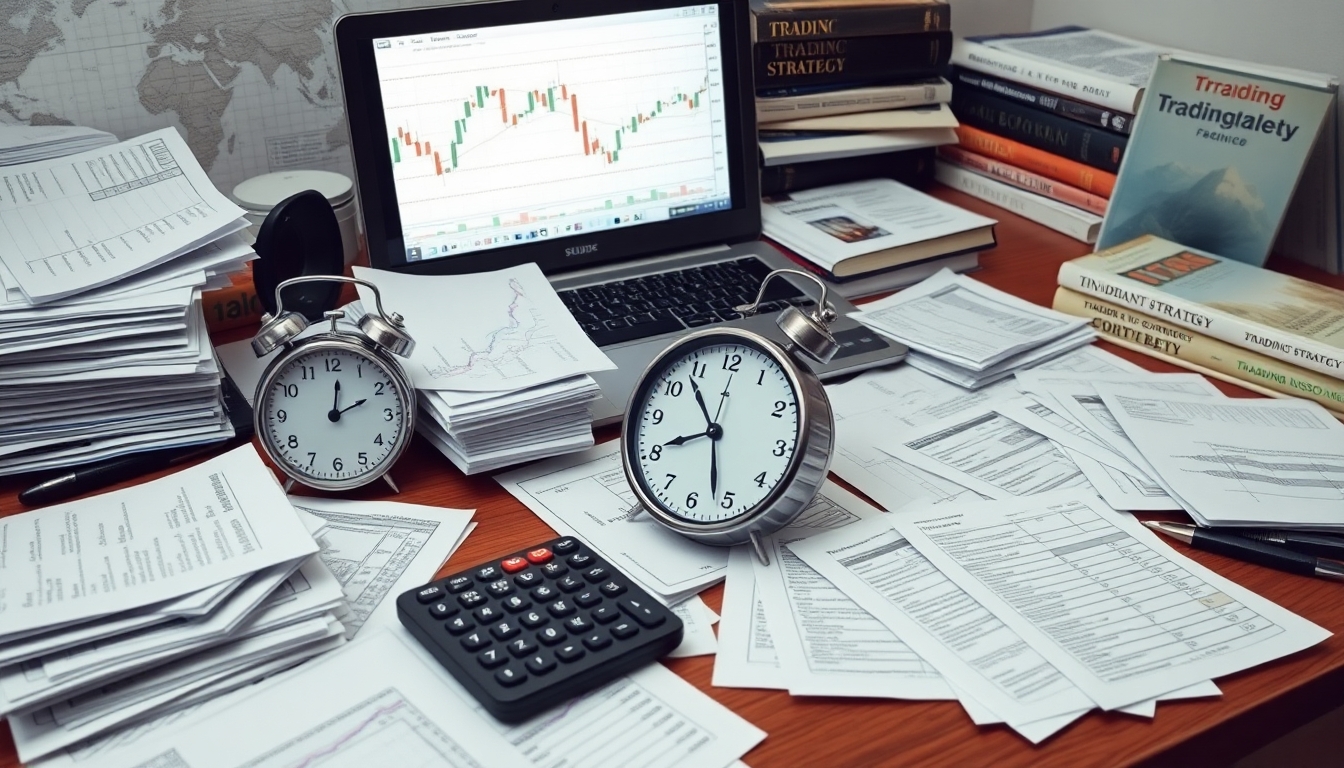
Ever felt that itch to trade just a bit more, thinking it might boost your returns? Well, you’re not alone. But here’s the kicker: frequent trading can be like playing with fire. It might seem thrilling, but it can scorch your returns faster than you can say “investment strategy.” Imagine trying to catch every wave in a stormy sea. Sounds exhausting, right? That’s what overtrading does to your portfolio.
Let’s break it down. When you trade often, you’re not just shifting stocks around. You’re also racking up transaction costs. Each trade comes with fees that nibble away at your profits. Think of it like a leaky bucket. No matter how much water you pour in, it never fills up. And then there’s the timing. Markets are unpredictable beasts. Even seasoned traders can’t always predict the next big move. So, trading frequently often means buying high and selling low, a surefire way to hurt your wallet.
But wait, there’s more. Overtrading isn’t just a financial drain; it’s a mental one too. The stress of constant monitoring and decision-making can be overwhelming. It’s like running a marathon at a sprinter’s pace. Eventually, you’ll burn out. And let’s not forget taxes. Every gain you make is subject to them, and frequent trading can leave you with a hefty tax bill at the end of the year. It’s these hidden costs that quietly erode your returns, leaving you wondering where it all went wrong.
So, what’s the moral of the story? Sometimes, less is more. By trading less frequently, you might just save yourself a lot of stress and money. Remember, investing is a marathon, not a sprint. The key is to find a pace that works for you and stick to it. In the end, it’s not about how often you trade, but how wisely you do it. So, next time you feel that trading itch, take a step back and think about the bigger picture. Your future self will thank you.
Why More Trades Don’t Equal Better Returns
Ever heard the saying, “Less is more”? Well, it rings especially true in the world of trading. You might think that the more you trade, the better your returns will be. But here’s the kicker: that’s often not the case. Frequent trading can actually chip away at your profits. How? Through increased transaction costs and poor timing. Imagine you’re at a buffet. Sure, you could pile your plate high, but that doesn’t mean you’ll enjoy every bite, right?
Every time you buy or sell, you’re hit with transaction fees. These might seem small at first, but they add up quicker than you’d think. It’s like a leaky faucet. Drip, drip, drip. Before you know it, you’ve got a hefty water bill. Similarly, these fees can eat into your returns, leaving you with less than you bargained for.
Then there’s the issue of timing. We all wish we had a crystal ball to predict market movements, but the truth is, timing the market is tough. Even seasoned investors get it wrong. When you trade frequently, you’re more likely to buy high and sell low, which is the exact opposite of what you want. It’s like trying to catch a falling knife; it rarely ends well.
In essence, while trading might feel like the fast track to wealth, more trades don’t necessarily mean better returns. It’s a classic case of quality over quantity. So, next time you feel the urge to trade, remember: sometimes, the best move is no move at all.
The Hidden Costs of Excessive Trading (Fees, Taxes, Stress)
Ever felt like you’re in a never-ending cycle of buying and selling stocks, only to find your profits dwindling? That’s the sneaky part of excessive trading. It’s like being on a treadmill that’s going nowhere fast. Let’s dive into why this happens. First up, we have the transaction fees. Every time you trade, there’s a cost. Think of it as a toll booth on your investing highway. These fees might seem small, but they add up quicker than you can say “portfolio.” Before you know it, a chunk of your potential gains is gobbled up by these pesky charges.
Next, let’s talk about taxes. Frequent trading often means you’re realizing short-term gains, which are taxed at a higher rate than long-term gains. It’s like paying a premium for being impatient. The government takes a bigger slice of the pie, leaving less for you to enjoy. And then there’s the stress. Oh, the stress! Constantly monitoring the market, making split-second decisions—it’s exhausting. It’s like being in a high-stakes game where the rules keep changing. This stress can cloud your judgment, leading to impulsive decisions that hurt your returns.
In short, excessive trading is a triple threat: fees, taxes, and stress. It’s a trifecta that can erode your profits and peace of mind. So, what’s the takeaway? Sometimes, less really is more. Instead of trying to time the market, consider a more strategic, long-term approach. Your wallet—and your sanity—will thank you.
How Overtrading Stems from Emotional Impulsivity
Ever felt the rush of adrenaline after a successful trade? That’s emotional impulsivity at work. It’s like riding a roller coaster; thrilling but risky. When emotions take the wheel, logic often gets tossed out the window. And that’s where overtrading begins. It’s not just about numbers and charts; it’s about the heart racing, the palms sweating, and that little voice inside saying, “Go for it!”
But here’s the kicker: emotional decisions can lead to financial chaos. You might think you’re on a winning streak, but in reality, you could be digging a deeper hole. Overtrading is like eating too much candy; it feels good at the moment but leaves you with a stomachache later. The key is to recognize when emotions are driving your trades. Are you buying just because you’re excited, or selling out of fear?
Let’s be honest; we’ve all been there. I’ve made impulsive trades after watching a stock’s price skyrocket, only to watch it plummet the next day. It’s a tough lesson to learn, but it’s crucial. The market doesn’t care about your feelings. It’s indifferent to your excitement or anxiety. Overtrading fueled by emotions can lead to poor timing and missed opportunities. It’s like trying to catch a falling knife; more often than not, you’ll get hurt.
So, how do you rein in those emotions? Start by setting clear goals and sticking to them. Create a plan and follow it diligently. When you feel the urge to trade impulsively, take a step back. Breathe. Remember, patience is a virtue in investing. Your future self will thank you for it.
The Link Between Overtrading and Overconfidence
Ever felt like you could predict the stock market’s next big move? You’re not alone. Many investors fall into the trap of overconfidence, believing they possess a crystal ball that others don’t. This misplaced confidence often leads to overtrading, a habit that can be as addictive as it is destructive.
Imagine you’re at a casino, convinced that your lucky streak will continue. You keep placing bets, ignoring the whispers of doubt. In trading, this is akin to thinking that more trades will mean more wins. But just like at the casino, the odds aren’t always in your favor. The market is unpredictable, and frequent trading based on overconfidence can lead to poor decisions and losses.
Overconfidence stems from a few psychological quirks. One is the illusion of control, where investors believe they can influence outcomes through sheer willpower. Another is the confirmation bias, where they only seek out information that supports their beliefs. Together, these can create a perfect storm, driving investors to trade more frequently than they should.
But how do you break this cycle of overconfidence and overtrading? Start by acknowledging the limits of your knowledge. Even the best investors make mistakes. It’s crucial to have a solid investment strategy and stick to it. This involves setting clear goals and knowing when to step back. Remember, sometimes the best move is no move at all.
So, next time you feel the urge to trade just one more time, pause and reflect. Is it truly a calculated decision, or just a shot in the dark fueled by overconfidence? Understanding this link can save you from the pitfalls of overtrading and keep your investments on the right track.
How to Break the Addiction to Constant Action
Ever find yourself glued to the screen, itching to make the next trade? You’re not alone. Many investors fall into the trap of constant action, believing that more trades equate to more profits. But here’s the kicker: it’s often the opposite. Breaking free from this cycle requires a mix of discipline, strategy, and a sprinkle of mindfulness.
First, let’s talk strategy. Imagine investing like planting a garden. You wouldn’t dig up your seeds every day to check their growth, right? The same goes for investments. Craft a clear, long-term investment plan and stick to it. This plan acts as your roadmap, guiding you through market ups and downs without the need for constant tinkering.
Next, let’s tackle the emotional side. Trading can be a rollercoaster of emotions—exhilarating highs and gut-wrenching lows. To manage this, practice mindfulness. Take a moment before each trade to breathe and reflect. Ask yourself: “Is this decision based on sound analysis or just a knee-jerk reaction?” This pause can be the difference between a rash decision and a well-considered one.
Finally, consider the power of discipline. Set rules for yourself. For instance, create a checklist of criteria that must be met before making a trade. This list acts as a safety net, ensuring that each decision is thoughtful and aligned with your goals. Over time, these habits can help curb the impulse to trade frequently.
Remember, investing isn’t about making a flurry of trades. It’s about making the right ones. By embracing a strategic, disciplined approach, you can break the addiction to constant action and pave the way for steady, long-term returns.
Frequently Asked Questions
- What is overtrading?
Overtrading refers to the practice of executing a high volume of trades in a short period. While it might seem like a way to maximize profits, it often results in increased transaction costs and poor investment decisions, ultimately hurting your returns.
- Why doesn’t frequent trading lead to better returns?
Frequent trading doesn’t guarantee better returns because each trade incurs transaction costs, like fees and taxes, which can add up quickly. Additionally, timing the market perfectly is nearly impossible, leading to potential losses rather than gains.
- What are the hidden costs associated with excessive trading?
Excessive trading brings hidden costs such as brokerage fees, short-term capital gains taxes, and the stress of constant decision-making. These can significantly erode your profits and affect your overall financial health.
- How does emotional impulsivity contribute to overtrading?
Emotional impulsivity can lead to overtrading as investors make hasty decisions driven by fear or greed. This impulsiveness often overrides rational thinking and can derail long-term investment strategies.
- Is there a connection between overconfidence and overtrading?
Yes, overconfidence in one’s trading abilities can lead to overtrading. Investors might believe they can consistently outperform the market, prompting them to trade more frequently than necessary, which can backfire.
- How can I break the cycle of constant trading?
To break the cycle of constant trading, it’s crucial to develop a disciplined investment strategy, practice mindfulness, and focus on long-term goals. Avoiding impulsive decisions and sticking to a plan can help improve financial outcomes.
